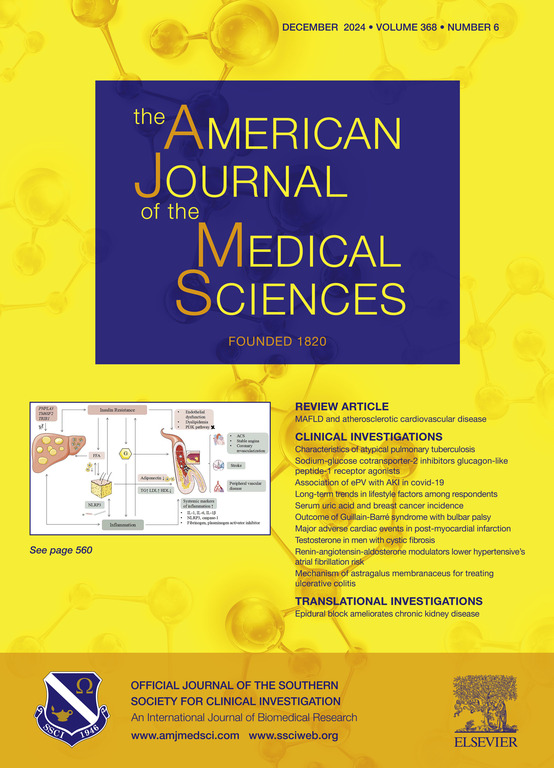急性疾病住院期间偶然贫血的住院检查的效用:一项回顾性队列研究。
IF 1.8
4区 医学
Q2 MEDICINE, GENERAL & INTERNAL
引用次数: 0
摘要
评价贫血的最佳时机尚不明确,在非贫血相关住院期间进行检查的临床效果尚不清楚。我们的目的是评估住院实验室贫血评估的预后价值。方法:这是一项2013-2022年在以色列Rabin医疗中心进行的回顾性倾向匹配队列研究。我们纳入了所有因非贫血相关原因入院并被发现为贫血的患者。根据基本的实验室贫血评估将患者分为两组。结果是癌症诊断、结肠镜检查率、入院时间和全因死亡率。采用竞争死亡风险进行多变量分析,p值为5%被认为是显著的。结果:匹配后,评估组纳入4238例患者,未评估组纳入7680例患者。住院患者实验室贫血评估与胃肠道癌症和任何癌症诊断相关——风险比分别为1.53 (95% CI, 1.15- 2.05)和1.23 (95% CI, 1.11-1.37)。随访1年后,评价组结肠镜检查率较高,贫血患病率较低。静脉铁治疗在评价组更为普遍。实验室贫血评估延长了入院时间(5天vs 4天)。在10年的随访中,全因死亡率没有差异。结论:基于基础实验室检查的住院患者贫血评估与门诊胃肠癌诊断率增加相关,具有临床和诊断优势。对于可以从早期胃肠道肿瘤诊断中获益的患者,入院是开始评估的有效机会。本文章由计算机程序翻译,如有差异,请以英文原文为准。
The utility of inpatient work-up of incidental anemia during hospitalization for an acute medical condition: A retrospective cohort study
Introduction
The best timing for evaluation of anemia is not well defined and the clinical yield of performing workup during non-anemia-related hospitalization is unclear. We aimed to evaluate the prognostic value of inpatient laboratory anemia evaluation.
Methods
This was a retrospective propensity-matched cohort study between the years 2013–2022 in Rabin Medical Center Israel. We included all patients admitted for non-anemia-related reasons and were found to be anemic. Patients were divided into groups based on basic laboratory anemia evaluation. Outcomes were cancer diagnosis, colonoscopy rate, duration of admission, and all-cause mortality. Multivariable analysis with competing risk of death was performed and a p-value of 5 % was considered significant.
Results
Following matching, 4,238 patients were included in the evaluation group compared to 7,680 in the no-evaluation group. In-patient laboratory anemia evaluation was associated with gastrointestinal cancer and any cancer diagnosis - HR of 1.53 (95 % CI, 1.15- 2.05) and HR of 1.23 (95 % CI, 1.11–1.37) respectively. The rate of colonoscopy was higher, and anemia prevalence was lower in the evaluation group after 1-year follow-up. Intravenous iron treatment was more prevalent in the evaluation group. The laboratory anemia evaluation prolonged the admission (5 vs 4 days). There was no difference in the all-cause mortality across the 10-year follow-up.
Conclusion
Inpatient anemia evaluation with basic laboratory tests was found to be associated with an increase in outpatient gastrointestinal cancer diagnosis and showed clinical and diagnostic advantages. For patients who can benefit from early gastrointestinal cancer diagnosis, admission holds a valid opportunity to initiate the evaluation.
求助全文
通过发布文献求助,成功后即可免费获取论文全文。
去求助
来源期刊
CiteScore
4.40
自引率
0.00%
发文量
303
审稿时长
1.5 months
期刊介绍:
The American Journal of The Medical Sciences (AJMS), founded in 1820, is the 2nd oldest medical journal in the United States. The AJMS is the official journal of the Southern Society for Clinical Investigation (SSCI). The SSCI is dedicated to the advancement of medical research and the exchange of knowledge, information and ideas. Its members are committed to mentoring future generations of medical investigators and promoting careers in academic medicine. The AJMS publishes, on a monthly basis, peer-reviewed articles in the field of internal medicine and its subspecialties, which include:
Original clinical and basic science investigations
Review articles
Online Images in the Medical Sciences
Special Features Include:
Patient-Centered Focused Reviews
History of Medicine
The Science of Medical Education.

 求助内容:
求助内容: 应助结果提醒方式:
应助结果提醒方式:


